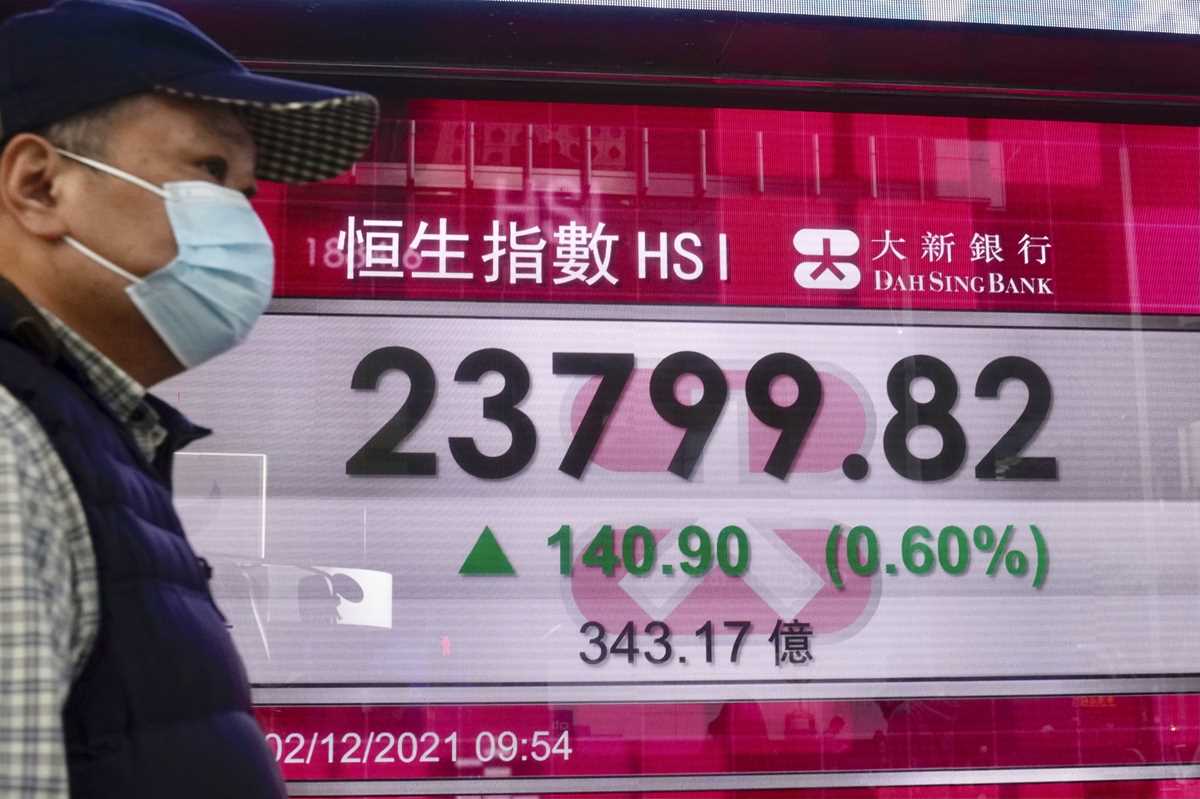 Traders David O'Day, left, and Colby Nelson work on the floor of the New York Stock Exchange, Wednesday, Dec. 1, 2021. The latest move in Wall Street's jolting roller-coaster ride is back up, as stocks, oil and bond yields climb in early Wednesday trading to recover some of their sharp losses from the day before. (AP Photo/Richard Drew)
Traders David O'Day, left, and Colby Nelson work on the floor of the New York Stock Exchange, Wednesday, Dec. 1, 2021. The latest move in Wall Street's jolting roller-coaster ride is back up, as stocks, oil and bond yields climb in early Wednesday trading to recover some of their sharp losses from the day before. (AP Photo/Richard Drew)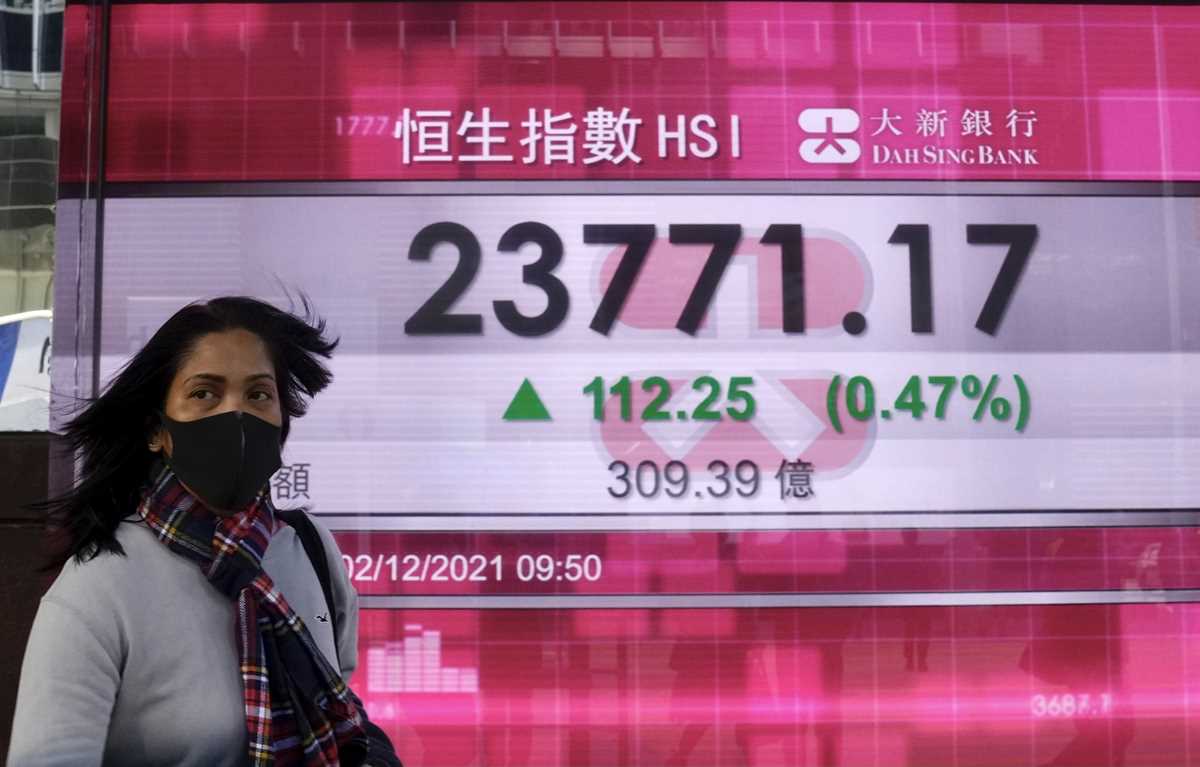 Trader Michael Conlon works on the floor of the New York Stock Exchange, Wednesday, Dec. 1, 2021. The latest move in Wall Street's jolting roller-coaster ride is back up, as stocks, oil and bond yields climb in early Wednesday trading to recover some of their sharp losses from the day before. (AP Photo/Richard Drew)
Trader Michael Conlon works on the floor of the New York Stock Exchange, Wednesday, Dec. 1, 2021. The latest move in Wall Street's jolting roller-coaster ride is back up, as stocks, oil and bond yields climb in early Wednesday trading to recover some of their sharp losses from the day before. (AP Photo/Richard Drew)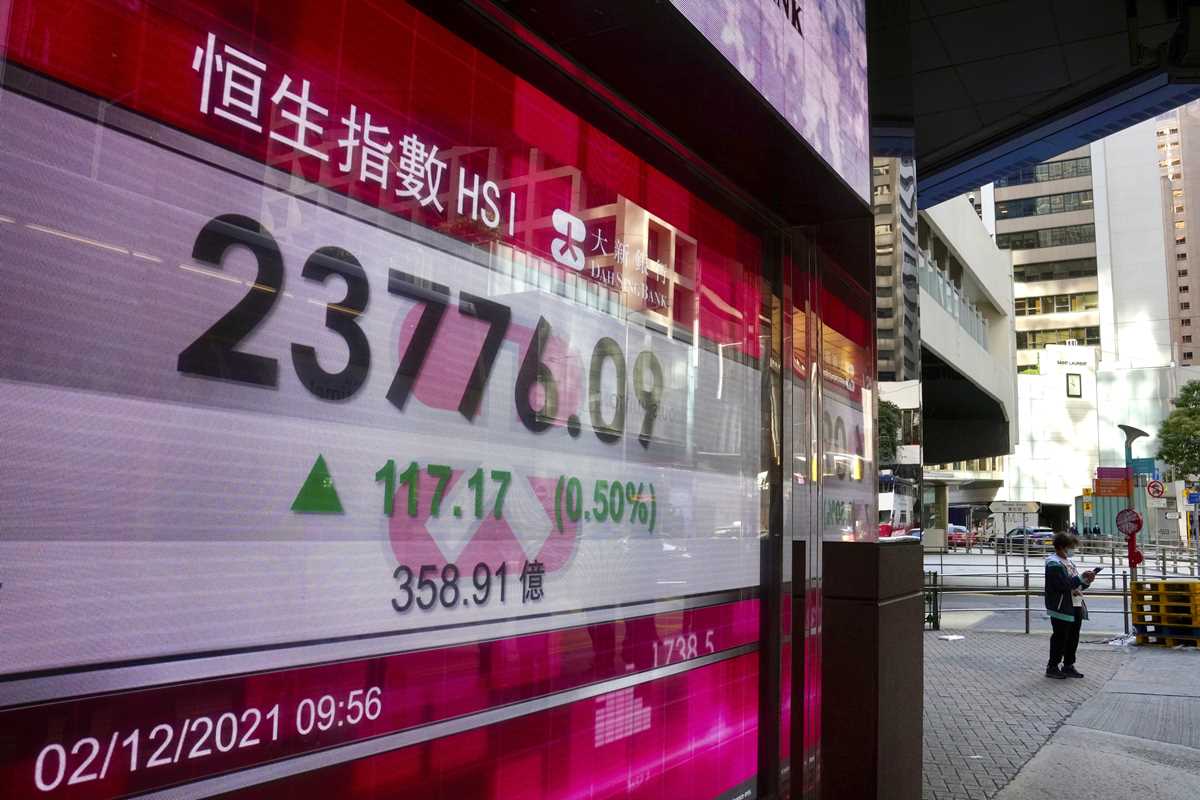 Trader John Romolo works on the floor of the New York Stock Exchange, Wednesday, Dec. 1, 2021. The latest move in Wall Street's jolting roller-coaster ride is back up, as stocks, oil and bond yields climb in early Wednesday trading to recover some of their sharp losses from the day before. (AP Photo/Richard Drew)
Trader John Romolo works on the floor of the New York Stock Exchange, Wednesday, Dec. 1, 2021. The latest move in Wall Street's jolting roller-coaster ride is back up, as stocks, oil and bond yields climb in early Wednesday trading to recover some of their sharp losses from the day before. (AP Photo/Richard Drew)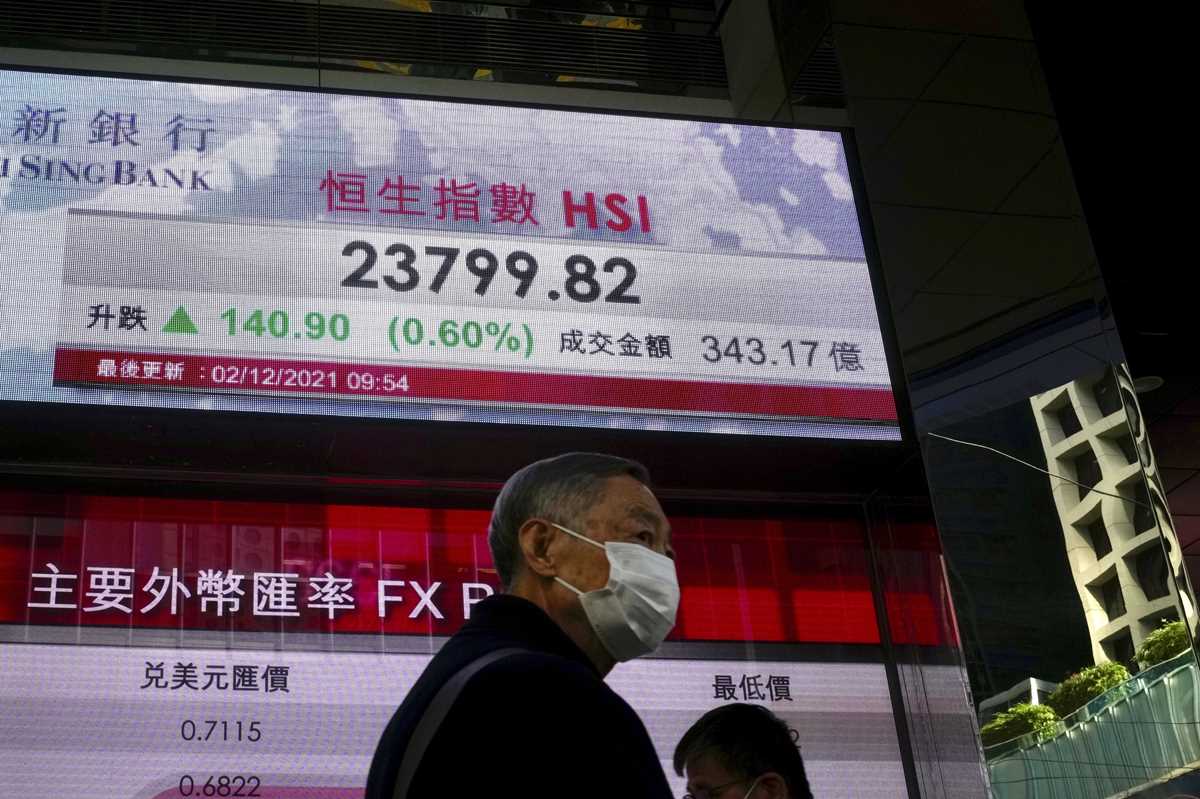 Trader John Panin, right, works on the floor of the New York Stock Exchange, Wednesday, Dec. 1, 2021. The latest move in Wall Street's jolting roller-coaster ride is back up, as stocks, oil and bond yields climb in early Wednesday trading to recover some of their sharp losses from the day before. (AP Photo/Richard Drew)
Trader John Panin, right, works on the floor of the New York Stock Exchange, Wednesday, Dec. 1, 2021. The latest move in Wall Street's jolting roller-coaster ride is back up, as stocks, oil and bond yields climb in early Wednesday trading to recover some of their sharp losses from the day before. (AP Photo/Richard Drew)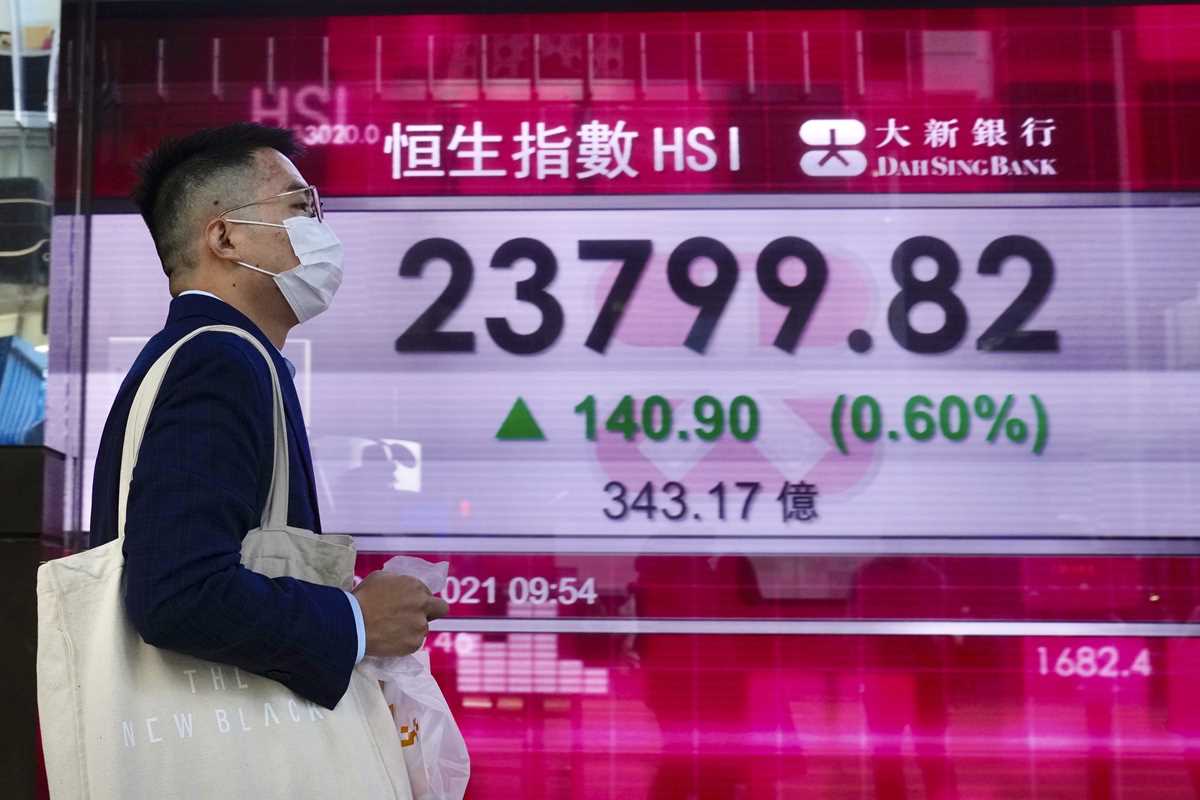 Trader Anthony Confusione works on the floor of the New York Stock Exchange, Wednesday, Dec. 1, 2021. Wall Street has investors on another roller-coaster ride Wednesday, as an early stock market rally lost steam in afternoon trading. (AP Photo/Richard Drew)
Trader Anthony Confusione works on the floor of the New York Stock Exchange, Wednesday, Dec. 1, 2021. Wall Street has investors on another roller-coaster ride Wednesday, as an early stock market rally lost steam in afternoon trading. (AP Photo/Richard Drew)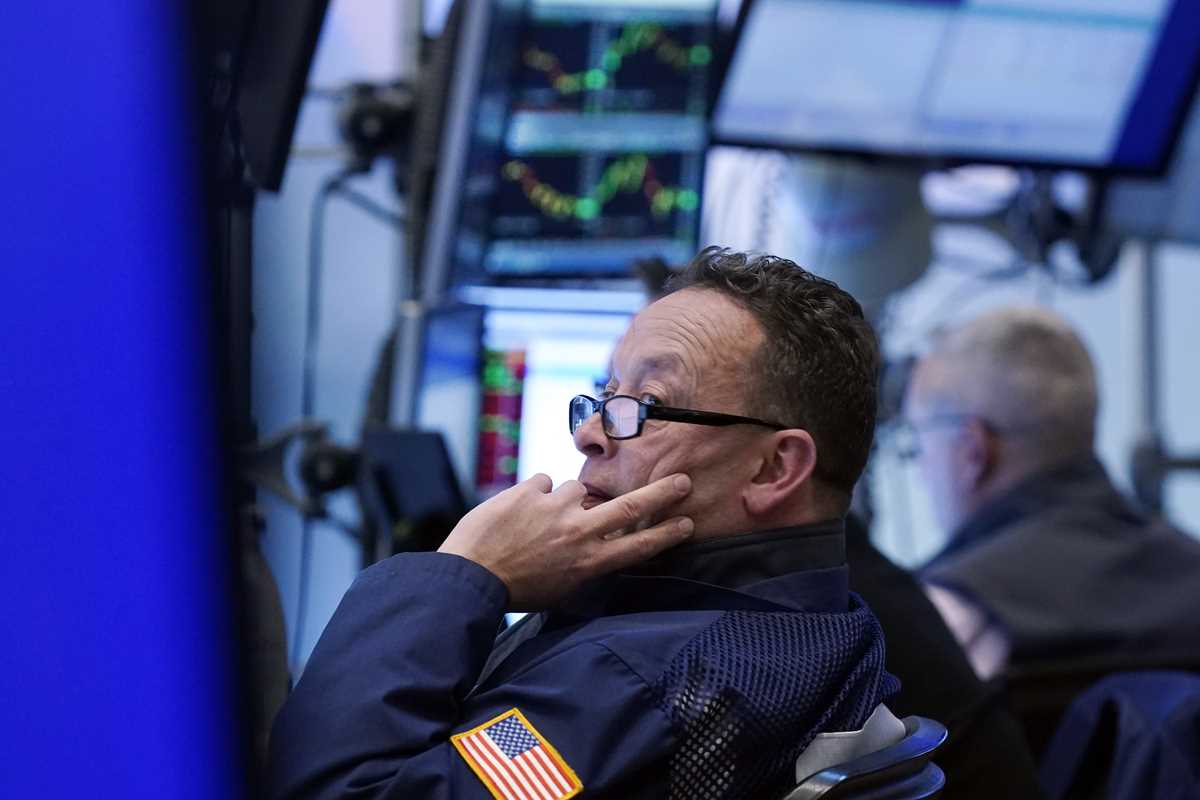 Traders work on the floor of the New York Stock Exchange, Wednesday, Dec. 1, 2021. Wall Street has investors on another roller-coaster ride Wednesday, as an early stock market rally lost steam in afternoon trading. (AP Photo/Richard Drew)
Traders work on the floor of the New York Stock Exchange, Wednesday, Dec. 1, 2021. Wall Street has investors on another roller-coaster ride Wednesday, as an early stock market rally lost steam in afternoon trading. (AP Photo/Richard Drew) Specialist Donald Himpele Jr. works at his post on the floor of the New York Stock Exchange, Wednesday, Dec. 1, 2021. Wall Street has investors on another roller-coaster ride Wednesday, as an early stock market rally lost steam in afternoon trading. (AP Photo/Richard Drew)
Specialist Donald Himpele Jr. works at his post on the floor of the New York Stock Exchange, Wednesday, Dec. 1, 2021. Wall Street has investors on another roller-coaster ride Wednesday, as an early stock market rally lost steam in afternoon trading. (AP Photo/Richard Drew) A man wearing a face mask walks past a bank's electronic board showing the Hong Kong share index in Hong Kong, Thursday, Dec. 2, 2021. Asian stock markets were mixed Thursday after a turbulent day on Wall Street as traders tried to forecast the impact of the coronavirus's omicron variant. (AP Photo/Kin Cheung)
A man wearing a face mask walks past a bank's electronic board showing the Hong Kong share index in Hong Kong, Thursday, Dec. 2, 2021. Asian stock markets were mixed Thursday after a turbulent day on Wall Street as traders tried to forecast the impact of the coronavirus's omicron variant. (AP Photo/Kin Cheung) A woman wearing a face mask walks past a bank's electronic board showing the Hong Kong share index in Hong Kong, Thursday, Dec. 2, 2021. Asian stock markets were mixed Thursday after a turbulent day on Wall Street as traders tried to forecast the impact of the coronavirus's omicron variant. (AP Photo/Kin Cheung)
A woman wearing a face mask walks past a bank's electronic board showing the Hong Kong share index in Hong Kong, Thursday, Dec. 2, 2021. Asian stock markets were mixed Thursday after a turbulent day on Wall Street as traders tried to forecast the impact of the coronavirus's omicron variant. (AP Photo/Kin Cheung) A bank's electronic board shows the Hong Kong share index in Hong Kong, Thursday, Dec. 2, 2021. Asian stock markets were mixed Thursday after a turbulent day on Wall Street as traders tried to forecast the impact of the coronavirus's omicron variant. (AP Photo/Kin Cheung)
A bank's electronic board shows the Hong Kong share index in Hong Kong, Thursday, Dec. 2, 2021. Asian stock markets were mixed Thursday after a turbulent day on Wall Street as traders tried to forecast the impact of the coronavirus's omicron variant. (AP Photo/Kin Cheung) A man wearing a face mask walks past a bank's electronic board showing the Hong Kong share index in Hong Kong, Thursday, Dec. 2, 2021. Asian stock markets were mixed Thursday after a turbulent day on Wall Street as traders tried to forecast the impact of the coronavirus's omicron variant. (AP Photo/Kin Cheung)
A man wearing a face mask walks past a bank's electronic board showing the Hong Kong share index in Hong Kong, Thursday, Dec. 2, 2021. Asian stock markets were mixed Thursday after a turbulent day on Wall Street as traders tried to forecast the impact of the coronavirus's omicron variant. (AP Photo/Kin Cheung) A man wearing a face mask walks past a bank's electronic board showing the Hong Kong share index in Hong Kong, Thursday, Dec. 2, 2021. Asian stock markets were mixed Thursday after a turbulent day on Wall Street as traders tried to forecast the impact of the coronavirus's omicron variant. (AP Photo/Kin Cheung)
A man wearing a face mask walks past a bank's electronic board showing the Hong Kong share index in Hong Kong, Thursday, Dec. 2, 2021. Asian stock markets were mixed Thursday after a turbulent day on Wall Street as traders tried to forecast the impact of the coronavirus's omicron variant. (AP Photo/Kin Cheung)BEIJING (AP) — Asian stock markets were mixed Thursday after a turbulent day on Wall Street as traders tried to forecast the impact of the coronavirus's omicron variant.
Tokyo and Sydney fell while Hong Kong and Seoul advanced. Shanghai was unchanged.
Wall Street's benchmark S&P 500 index ended down 1.2% on Wednesday after gaining 1.9% earlier in the day. That was despite surveys showing U.S. hiring and factory activity in November were better than expected.
Markets were sliding when the White House announced the discovery of the first omicron case in the United States. It is unclear whether omicron is more dangerous than other variants, but governments have responded by tightening travel controls, fueling unease about the outlook for a global economic recovery.
The latest data “painted an optimistic picture for economic conditions, but that seems to be taking a backseat as the omicron variant can potentially shift the landscape,” Yeap Jun Rong of IG said in a report.
The Shanghai Composite Index held steady at 3,577.03 while the Nikkei 225 in Tokyo lost 0.4% to 27,825.15. The Hang Seng in Hong Kong gained 0.2% to 23,714.00.
The Kospi in Seoul surged 1.1% to 2,930.47 while Sydney's S&P-ASX 200 lost less than 0.1% to 7,231.20.
India's Sensex opened up 0.6% at 58,037.76. New Zealand and Singapore fell while Jakarta advanced.
On Wall Street, the S&P 500 fell to 4,513.04. The Dow Jones Industrial Average declined 1.3% to 34,022.04. The Nasdaq slid 1.8% to 15,254.05.
The S&P 500 on Friday turned in its biggest loss since February, sliding 2.3%. It rose 1.3% on Monday and gave up 1.9% on Tuesday.
On Wednesday, the Institute for Supply Management reported U.S. manufacturing growth activity accelerated faster than expected in November. Payroll processor ADP said employers hired more people than expected. That might raise expectations for Friday's U.S. government jobs data.
Investors already were rattled after Federal Reserve chairman Jerome Powell said Tuesday the U.S. central bank might withdraw stimulus sooner than expected due to persistently high inflation.
The Fed's bond purchases are injecting money into the financial system, boosting stock prices. The S&P500 has more than doubled since March 2020.
In energy markets, benchmark U.S. crude rose 88 cents to $66.45 in electronic trading on the New York Mercantile Exchange. The contract fell 61 cents on Wednesday to $65.57. Brent crude, the price standard for international oils, gained 90 cents to $69.77 per barrel in London. It lost 36 cents the previous session to $68.87.
The dollar gained to 113.05 yen from Wednesday's 112.79 yen. The euro held steady at $1.1319.
Before you make your next trade, you'll want to hear this.
MarketBeat keeps track of Wall Street's top-rated and best performing research analysts and the stocks they recommend to their clients on a daily basis.
Our team has identified the five stocks that top analysts are quietly whispering to their clients to buy now before the broader market catches on... and none of the big name stocks were on the list.
They believe these five stocks are the five best companies for investors to buy now...
See The Five Stocks Here
Wondering where to start (or end) with AI stocks? These 10 simple stocks can help investors build long-term wealth as artificial intelligence continues to grow into the future.
Get This Free Report